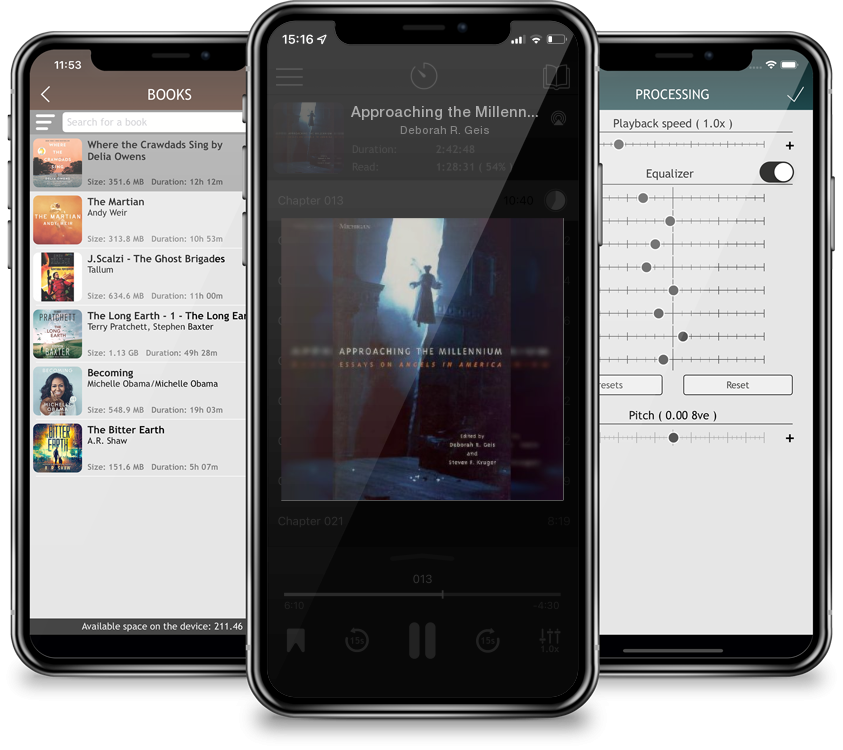Listen to Approaching the Millennium: Essays on Angels in America (Theater: Theory/Text/Performance) by Deborah R. Geis
Enjoy this audiobook with MP3 Audiobook Player - the ultimate iOS audiobook experience


Tony Kushner's complex and demanding play Angels in America: A Gay Fantasia on National Themes has been the most talked about, analyzed, and celebrated play of the decade. The critic Harold Bloom has included Kushner's play in his "Western canon" alongside Shakespeare and the Bible, and drama scholar John M. Clum has termed it "a turning point in the history of gay drama, the history of American drama, and of American literary culture." While we might be somewhat wary of the instant canonization that such critical assessments confer, clearly Kushner's play is an important work, honored by the Pulitzer Prize, thought worthy of recognition on "purely aesthetic" grounds at the same time that it has been embraced--and occasionally rejected--for its politics. Kushner's play explicitly positions itself in the current American conflict over identity politics, yet also situates that debate in a broader historical context: the American history of McCarthyism, of immigration and the "melting pot," of westward expansion, and of racist exploitation. Furthermore, the play enters into the politically volatile struggles of the AIDS crisis, struggles themselves interconnected with the politics of sexuality, gender, race, and class. The original essays in Approaching the Millennium explore the complexities of the play and situate it in its particular, conflicted historical moment. The contributors help us understand and appreciate the play as a literary work, as theatrical text, as popular cultural phenomenon, and as political reflection and intervention. Specific topics include how the play thematizes gender and sexuality, race and ethnicity; the postmodern incarnation of the Brechtian epic; AIDS and the landscape of American politics. The range of different international productions of Angels in America provides a rich basis for discussion of its production history, including the linguistic and cultural shifts required in its "translation" from one stage to the next. The last section of Approaching the Millennium includes interviews with Tony Kushner and other key creators and players involved in the original productions of Angels. The interviews explore issues raised earlier in the volume and dialogues between the creative artists who have shaped the play and the critics and "theatricians" engaged in responding to it. Contributors to this volume are Arnold Aronson, Art Borreca, Gregory W. Bredbeck, Michael Cadden, Nicholas de Jongh, Allen J. Frantzen, Stanton B. Garner, Deborah R. Geis, Martin Harries, Steven F. Kruger, James Miller, Framji Minwalla, Donald Pease, Janelle Reinelt, David Román, David Savran, Ron Scapp, and Alisa Solomon. Deborah Geis is Associate Professor of English, Queens College, City University of New York. Steven F. Kruger is Professor and Chair of the Department of English, Queens College, City University of New York.
I never knew my daily walks could be so fulfilling – all thanks to this app. From novels to speeches, this app's versatility in playing various audio formats has turned my daily activities into enriching listening sessions. What a game-changer! 🌟📚
I'm blown away by how this app has made my workouts more enjoyable and my mind more active. ListenBook's drag-and-drop download feature streamlines the process of adding new content to my library. The compatibility with Apple Watch is a game-changer. Controlling my audiobooks from my wrist is genius. I love the ability to share my progress with friends. It’s a fun feature.
I can't believe how much more I'm able to read with the help of this app. ListenBook's commitment to delivering an exceptional audiobook experience is evident in its thoughtful features and design. Streamlining my audiobook journey – this app's design is top-notch. ListenBook's integration with CarPlay and Apple Watch is a seamless addition to my daily routine.
I never knew my daily walks could be so fulfilling – all thanks to this app. ListenBook's powerful audio downloading features are a dream come true – no more hassles! I can't imagine my life without this app – it has made audiobook enjoyment effortless and convenient.
This app has made my commutes and long drives a source of joy and learning. 🎉 Rekindling my love for stories – this app's accessibility has reignited my passion! 📖🚀 User-friendly audiobook experience – this app's design is a standout. Sharing books with friends via AirDrop is so convenient. Thanks, ListenBook!
Listening to audiobooks while gardening has made my outdoor time even more relaxing. The automatic extraction of artwork and metadata keeps my audiobook library organized and visually appealing.
Plays MP3, MP4, OPUS, OGG, FLAC, AWB, M4B, M4A, WMA, AAC formats
Optimized for iPhone, iPad, and iPod with seamless integration
Adjust playback speed from 0.5x to 3.0x for your listening preference
Import audiobooks via iTunes, cloud services, or direct downloads
Get your favorite audiobooks in supported formats from various sources
Import audiobooks to MP3 Audiobook Player using multiple methods
Control playback from your device, headphones, Apple Watch, or CarPlay
Join thousands of users who enjoy audiobooks with MP3 Audiobook Player daily
Download Now